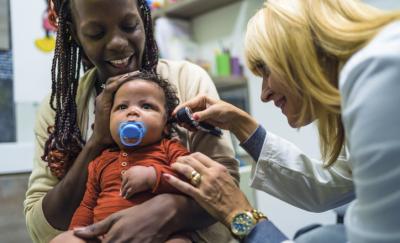Authors
Gabriella Newes-Adeyi, Tyler Morrill, Abt Global; Lawrence Reichle (formerly Abt Global); Fatimah S. Dawood, Kristina Wielgosz, Natalie Thornburg, Sascha Ellington, Romeo R. Galang, Centers for Disease Control and Prevention; Alan Tita, Ashley Battarbee, Mickey Parks, University of Alabama; Melissa S. Stockwell, Cynthia Gyamfi-Bannerman, Celibell Y. Vargas, New York Presbyterian Hospital; Kelly Vorwaller, Emily Powers, Marie Gibson, Michael Varner, University of Utah
Pregnant women were excluded from most early COVID-19 vaccine trials. Their involvement awaited evidence of safety and efficacy. The result was limited data about the level of antibodies that vaccines provided to pregnant individuals and about how antibodies transferred from the pregnant mother to the infant.
A new Centers for Disease Control and Prevention study, co-authored by Abt Global, found that after two doses, 93 percent of pregnant participants in the study had detectable antibodies, though the level was less than in non-pregnant participants. In addition, the study found antibody levels measured at delivery were higher for pregnant participants vaccinated during the third trimester than those vaccinated during the first trimester.
The study of 186 individuals also found that antibodies in infants, who still cannot be vaccinated until they are older than six months, declined rapidly. At three months, 28 percent had no detectable antibodies, and that rose to 74 percent at six months. The waning protection for infants suggests that prevention strategies such as vaccinating caregivers and household contacts may be a way to increase infant safety for those under six months of age. When infants reach six months, they should get vaccinations. Further exploration of novel maternal COVID-19 vaccination approaches to protect young infants, such as COVID-19 booster vaccination during the third trimester, might also be warranted.
The studies, which examined the original SARS-CoV-2 strain and five variants, were conducted at three U.S. medical centers located in Salt Lake City, UT; New York City, NY; and Birmingham, AL. The participants were part of a surveillance study called the Epidemiology of SARS-CoV-2 in Pregnancy and Infancy (ESPI) study. It involved systematic surveillance for asymptomatic and symptomatic SARS-CoV-2 infection confirmed by testing. Participants provided information about receipt of a COVID-19 vaccine, which we verified with electronic medical record documentation. All participants reached the end of their pregnancy by October 2021, before the Omicron variants emerged and began circulating in the U.S. During March–July 2021, sites enrolled pregnant women from the ESPI cohort and a convenience sample of pregnant and non-pregnant individuals from the broader community into an observational COVID-19 study on immune response to the COVID-19 vaccine.



